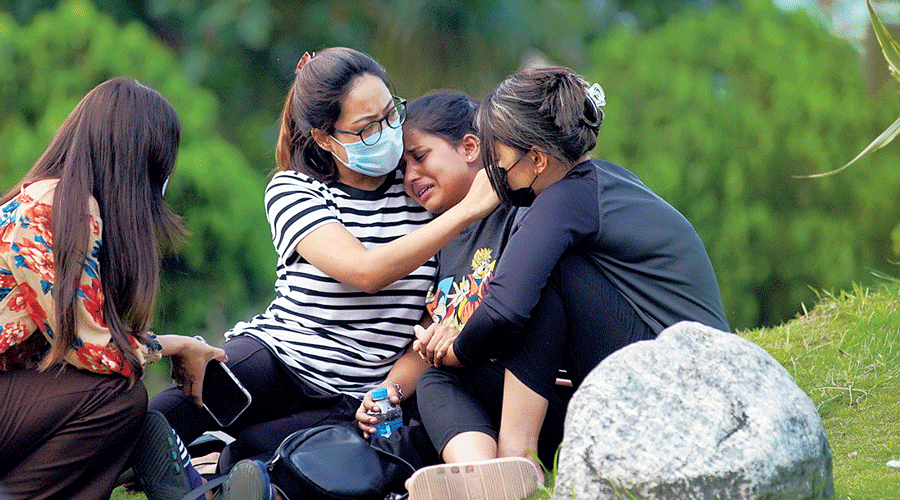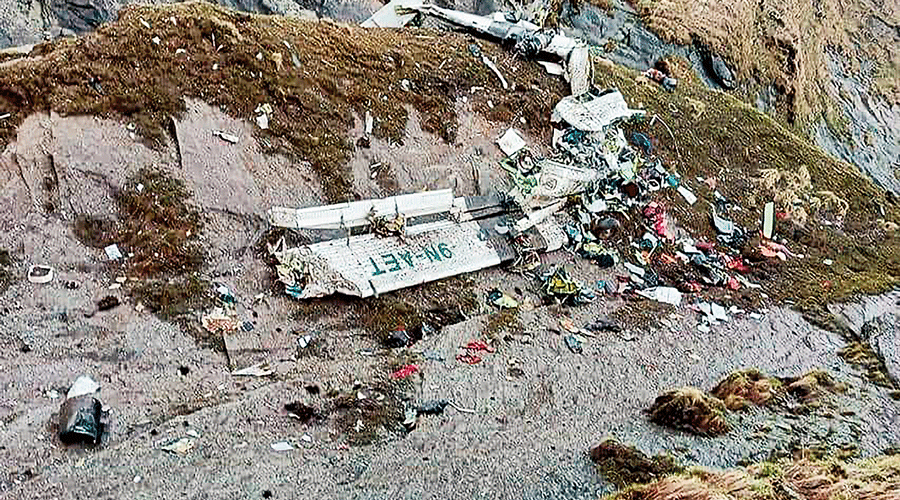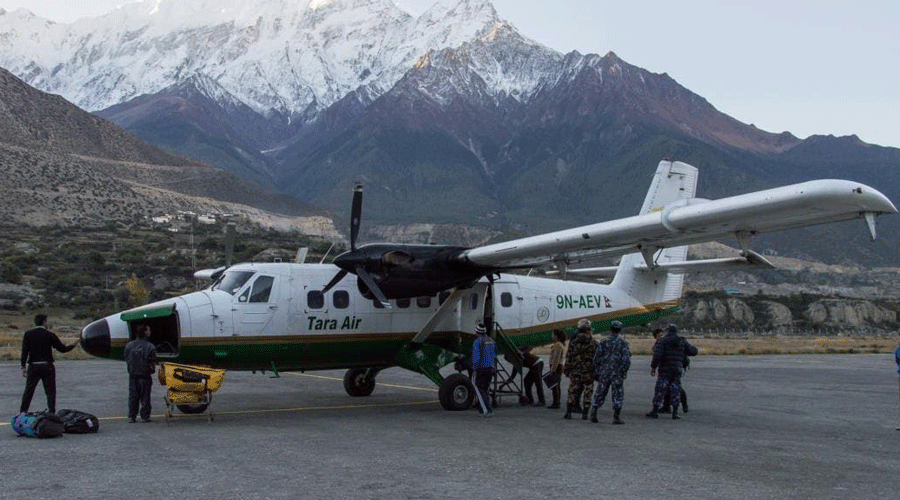Nepal authorities on Monday recovered or located the bodies of all but one of the 22 people who were on board a plane that crashed into a Himalayan mountainside on Sunday, officials said.
“There is very little chance to find survivors,” Deo Chandra Lal Karna, spokesman for Nepal’s civil aviation authority, said with just one of the crash victims yet to be spotted.
Soldiers and rescue workers had retrieved 20 bodies from the wreckage, strewn across a steep slope at an altitude of around 14,500 feet in Mustang district. They were trying to recover another body they had seen, officials said.
Four Indians, two Germans and 16 Nepalis — including the crew of three — were on the De Havilland Canada DHC-6-300 Twin Otter aircraft that crashed 15 minutes after its 9.55am takeoff from the tourist town of Pokhara, 125km west of Kathmandu, on Sunday.
The plane was headed to Jomsom, a popular tourist and pilgrimage site that lies about 80km northwest of Pokhara, usually a 20-minute flight. But it lost contact with the Pokhara control tower five minutes before it was due to land.

Grieving relatives of passengers of the Tara Air plane. AP/PTI
The four Indians on board have been identified as Ashok Kumar Tripathy, his wife Vaibhavi Bandekar (Tripathy) and their children Dhanush and Ritika.
In Kathmandu, relatives of victims waited for the bodies to be brought back from the crash site.
“I am waiting for my son’s body,” said Maniram Pokhrel, his voice choking. His son Utsav Pokhrel, 25, was the co-pilot.
“He always wanted to be a pilot. He left us too early,” Maniram said as he burst into tears.
Pokhrel was the first person from his remote village in the Rukum district to become a pilot, his family said, after he learned to fly in the Philippines.
The family was so proud of him that they also enrolled his younger brother, Umesh, in a pilot training programme in the Philippines.
“He has just three months left to complete his course,” Maniram said. “I am confused whether to ask him to be a pilot or ask him to leave.”
At least seven of the Nepali passengers were from the same family, making a pilgrimage to the Muktinath Temple in Jomsom, media reports said.
Crash site
The difficult terrain and poor weather hampered the search on Sunday. The Nepali army spotted the wreckage on Monday morning.
Sudarshan Bartaula, spokesperson for the privately owned Tara Air to which the plane belonged, said the bodies were scattered over a 100-metre radius. “The impact has blown the bodies all over the hill.”
Nepal army spokesperson Brigadier General Narayan Silwal tweeted “Crash site: Sanosware, Thasang-2, Mustang” along with a picture of what appeared the wreckage of the aircraft. The photo showed that the tail and one wing were intact.
An eyewitness, Inda Singh, who was on his way to clear a blocked road, found that the plane had crashed, My Republica newspaper reported.
”All the passengers are dead,” Singh was quoted as saying. “The dead bodies are intact and the faces of all victims are recognisable.”
Singh said there was no fire on the aircraft.
An image published in Nepali media showed uniformed rescue workers moving a body from the wreckage and using ropes to haul it onto a stretcher and up a steep, grassy ridge.
Netra Prasad Sharma, chief administrator of Mustang district, said rescue work had been halted in the late afternoon because of bad weather.
Cause unclear
Nepali officials said the cause of the crash was not immediately clear. The most likely possibility, they said, was that the plane had crashed into a mountain after it lost contact with air traffic controllers while navigating in particularly bad weather.
“Initially, the weather was good,” said Puskal Sharma, chief of the Jomsom airport, but it quickly “worsened just when we were asking the Tara Air plane for the final position. Then, we lost the connection immediately.”
The Nepal government said it had set up a five-member panel to determine the cause of the crash and suggest prevention measures for the future.
Sharma said two small planes had successfully landed at the Jomsom airport early on Sunday morning.
Safety record
Air accidents are not uncommon in mountainous Nepal where the weather can change suddenly and make for hazardous conditions.
To reach remote mountainous places like Jomsom, residents and visitors rely on small twin-engine planes. The route from Pokhara to Jomsom is considered one of the riskiest because planes have to fly through narrow valleys, where visibility is often a challenge.
Crashes are relatively common given the frequent bad weather, rocky terrain and aging plane fleets.
Flight-tracking website Flightradar24 said the aircraft that had crashed on Sunday had first flown 43 years ago.
In 2016, 23 people were killed when a Tara Air plane went down on the same route as the one on Sunday.
In response to the poor safety record of Nepali airlines, the European Union has barred the planes from its airspace.












